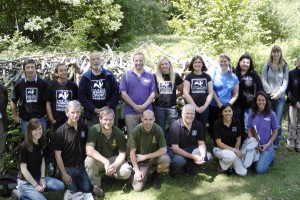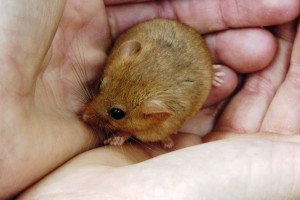This week saw our latest hazel dormouse release to a secret woodland location in Nottinghamshire in an attempt to stem the further decline one of our rarest mammals.
Dormice were once widespread throughout much of England and Wales, but over the past 100 years, their range and population has diminished significantly due to the loss of woodlands and hedgerows, as well as traditional habitat management practices, and the species is now rare and vulnerable to extinction.
 We have been working hard in consultation with Nottinghamshire Wildlife Trust to carefully select this year’s location for the reintroduction of the twenty breeding pairs, clustering it closely with the sites of two previously successful releases in 2013 and 2014.
We have been working hard in consultation with Nottinghamshire Wildlife Trust to carefully select this year’s location for the reintroduction of the twenty breeding pairs, clustering it closely with the sites of two previously successful releases in 2013 and 2014.
Ian White, Dormouse Officer at PTES explains: “Woodland and hedgerows will be improved between the three reintroduction sites, so that as the separate dormouse populations establish themselves in their respective woodlands, they will later have the opportunity to disperse and eventually join up. This will improve chances for the long-term survival of the species.”
The dormice that were released have been captive bred through the Common Dormouse Captive Breeders Group. Prior to release, they undergo thorough checks with vets at the Zoological Society of London (ZSL) and Paignton Zoo in Devon to make sure they are healthy and have the best chance of survival.
 Following the health checks, the dormice were then released on-site in breeding pairs in their own wooden nest box fitted inside a mesh cage secured to trees. The mesh cages, filled with food and water, help the dormice adjust to their new home in the wild. The cages are eventually removed once the animals have settled into the wood.
Following the health checks, the dormice were then released on-site in breeding pairs in their own wooden nest box fitted inside a mesh cage secured to trees. The mesh cages, filled with food and water, help the dormice adjust to their new home in the wild. The cages are eventually removed once the animals have settled into the wood.
The reintroductions play an important role in the long-term conservation of this endangered species and are part of the Species Recovery Programme supported by Natural England.
This year marks our 25th dormouse reintroduction; over the last 22 years, more than 750 dormice have been released at 19 different sites across 12 English counties.
You can help give the dormice a better chance of survival by supporting our future work today.
